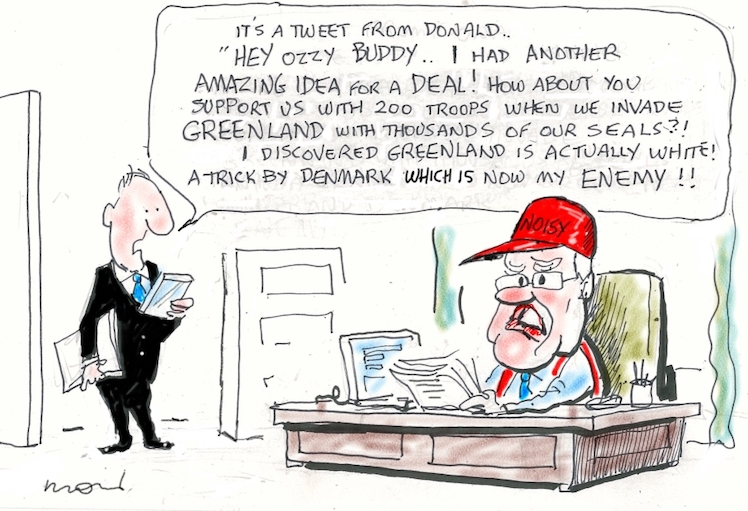Wikileaks cables reveal Iran presents no threat to Australia and little threat to the US. Instead, clear intelligence from the US, Australia and Iran confirms Iran, although portrayed as aggressive, has pursued a defensive military strategy. Clinton Fernandez reports.
This week, Australia announced it would send military forces to patrol the Persian Gulf alongside Bahrain, Britain and the United States. “Iran’s unprovoked attacks on international shipping,” required nothing less, according to US Secretary of State Mike Pompeo.
The US had previously withdrawn from the so-called “Iran nuclear deal,” known as the Joint Comprehensive Plan of Action, and imposed sanctions against Iran. Iran went to the International Court of Justice, asking it to rule on the legality of these sanctions. In a unanimous decision, all 15 judges of the International Court of Justice – including American judge ad hoc Charles Brower – ordered the United States to ease some sanctions against Iran.
The US response is instructive: a 1955 Treaty between the United States and Iran had provided the jurisdictional basis for Iran’s case. The US said it would renounce the Treaty, and added more sanctions to those it had already imposed. Current rhetoric about a Rules-Based International Order tends to tiptoe around this episode; but here it is Iran which resorted to legal rather than aggressive means.

Australian troops for Greenland? (cartoon by Alan Moir)
Iran: a Clayton’s threat
Exactly what kind of threat does Iran pose? And how does the United States view its own conduct? Diplomatic cables leaked to Wikileaks in 2010 provide revealing insights into these questions. The cables written by American diplomats in Australia are especially revealing because the two countries have a very close relationship in a number of spheres.
This doesn’t mean the US sees Australia as vital; the relationship is heavily asymmetrical, with Australia going out of its way to demonstrate its relevance, as its decision to send military forces to the Persian Gulf illustrates. Combined with evidence given by the Pentagon and US intelligence agencies to the US Congress, a clearer picture of Iranian motives emerges.
As to the first question – what kind of threat does Iran pose – we have the testimony of Lieutenant General Ronald L. Burgess, Director of the US Defense Intelligence Agency. He told the United States Senate Committee on Armed Services that the strategic objectives of Iran’s leadership are:
“first and foremost, regime survival … Iran’s military strategy is designed to defend against external threats, particularly from the United States and Israel. Its principles of military strategy include deterrence, asymmetrical retaliation, and attrition warfare… Iran’s defense spending as a share of GDP is relatively low compared to the rest of the region. This reflects its defensive military doctrine, which is designed to slow an invasion and force a diplomatic solution to hostilities. Iranian military training and public statements echo this defensive doctrine.”
A defensive military doctrine
In other words, US intelligence confirmed that Iran’s defence was low in comparative terms, was aimed specifically at defence rather than aggression, and sought to deter an invasion long enough for diplomacy to set in. If it ever developed nuclear weapons, they would be remain part of a deterrence strategy.
But a deterrence strategy would be unwelcome to the United States precisely because it would deter; it could prevent the United States and its allies from free, unconstrained military action in the region. The United States interprets the prospect of a deterrent as a very serious threat.
Furthermore, Iran remembers former President Bush’s declaration in January 2002 that it was part of the “Axis of Evil” along with Iraq and North Korea. The subsequent fate of Iraq no doubt weighs heavily on the minds of Iranian policymakers. They – like North Korea’s leaders – know that international law will not protect them if the US decides to attack them. They have to take steps to protect themselves.
Australian cables show Iran no rogue state
The leaked cables show that Australia’s intelligence agencies also acknowledge that Iran seeks a deterrent. During discussions with the United States in 2008, Australia’s intelligence analysts appeared to take a calm view of Iran’s nuclear program, saying it fell “within the paradigm of ‘the laws of deterrence.’” It was “a mistake to think of Iran as a ‘Rogue State,’” according to Peter Varghese, then the Director-General of the Australian Office of National Assessments.
RT @TheAustralia: #Iran is not a rogue state, says #Australia in #WikiLeaks cable http://dlvr.it/BJRh4
— ㅤWikiLeaks Updates (@wikicables) December 13, 2010
What is especially instructive about the cables released by Wikileaks is the second question — how does the United States view its own conduct? According to another cable, an American diplomat once reported confidentially on a conversation with an Iranian university professor. She was no admirer of her country’s leaders.
She said people obeyed them because they had to “pretend to follow those stupid, crazy mullahs.” But she also referred to “Western interference in Iranian internal political affairs” in what the American diplomat described as “one very emotional moment.” He added that “in the Iranian worldview there is always someone or something else to blame for one’s misfortunes. This may be a ruler, a boss, the weather or fate in general.”
The diplomat was surely familiar with his own country’s record here: the United States overthrew Iran’s conservative nationalist parliamentary government in 1953, installed an autocratic leader who let American oil companies have 40% of Iran’s oil concessions, and supported him until his overthrow by a popular mass movement in 1979. It then punished Iran by backing Iraq’s Saddam Hussein in the Iran–Iraq War. And yet, the diplomat reporting this conversation could not accept the truth of “Western interference in Iranian internal political affairs” even to, or especially to, himself. He had to recast history in other terms.
The cables released by Wikileaks are valuable because of the privileged access US diplomats enjoy in elite circles around the world. They allow the public to understand how US diplomats perceive key aspects of most countries: who holds power and why, how do these people make key decisions, how can they be influenced, who is beholden to whom, and what the public thinks about certain topics. They are a window into America’s global objectives.
In this and subsequent posts, I will treat the cables as if they were an advance release of archival information. In doing so, I focus on the actions of the U.S. government – and perhaps keep faith with the original motives of the whistle-blower and Wikileaks itself.
———————-
Clinton Fernandez is Professor of International and Political Studies, UNSW Canberra, and author of “Island off the Coast of Asia: Instruments of Statecraft in Australian Foreign Policy”.
Media dead silent as Wikileaks insider explodes the myths around Julian Assange
Public support is vital so this website can continue to fund investigations and publish stories which speak truth to power. Please subscribe for the free newsletter, share stories on social media and, if you can afford it, tip in $5 a month.
Clinton Fernandes is Professor of International and Political Studies. He holds dual appointments at the School of Humanities and Social Sciences and the Australian Centre for Cyber Security. His research agenda is linked to the Australian Research Council’s strategic priority area of "Securing Australia’s place in a changing world."

